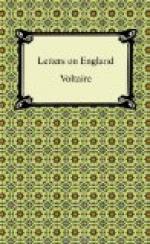LETTER V.—ON THE CHURCH OF ENGLAND
England is properly the country of sectarists. Multae sunt mansiones in domo patris mei (in my Father’s house are many mansions). An Englishman, as one to whom liberty is natural, may go to heaven his own way.
Nevertheless, though every one is permitted to serve God in whatever mode or fashion he thinks proper, yet their true religion, that in which a man makes his fortune, is the sect of Episcopalians or Churchmen, called the Church of England, or simply the Church, by way of eminence. No person can possess an employment either in England or Ireland unless he be ranked among the faithful, that is, professes himself a member of the Church of England. This reason (which carries mathematical evidence with it) has converted such numbers of Dissenters of all persuasions, that not a twentieth part of the nation is out of the pale of the Established Church. The English clergy have retained a great number of the Romish ceremonies, and especially that of receiving, with a most scrupulous attention, their tithes. They also have the pious ambition to aim at superiority.
Moreover, they inspire very religiously their flock with a holy zeal against Dissenters of all denominations. This zeal was pretty violent under the Tories in the four last years of Queen Anne; but was productive of no greater mischief than the breaking the windows of some meeting-houses and the demolishing of a few of them. For religious rage ceased in England with the civil wars, and was no more under Queen Anne than the hollow noise of a sea whose billows still heaved, though so long after the storm when the Whigs and Tories laid waste their native country, in the same manner as the Guelphs and Ghibelins formerly did theirs. It was absolutely necessary for both parties to call in religion on this occasion; the Tories declared for Episcopacy, and the Whigs, as some imagined, were for abolishing it; however, after these had got the upper hand, they contented themselves with only abridging it.
At the time when the Earl of Oxford and the Lord Bolingbroke used to drink healths to the Tories, the Church of England considered those noblemen as the defenders of its holy privileges. The lower House of Convocation (a kind of House of Commons) composed wholly of the clergy, was in some credit at that time; at least the members of it had the liberty to meet, to dispute on ecclesiastical matters, to sentence impious books from time to time to the flames, that is, books written against themselves. The Ministry which is now composed of Whigs does not so much as allow those gentlemen to assemble, so that they are at this time reduced (in the obscurity of their respective parishes) to the melancholy occupation of praying for the prosperity of the Government whose tranquillity they would willingly disturb. With regard to the bishops, who are twenty-six in all, they still have seats in the House




